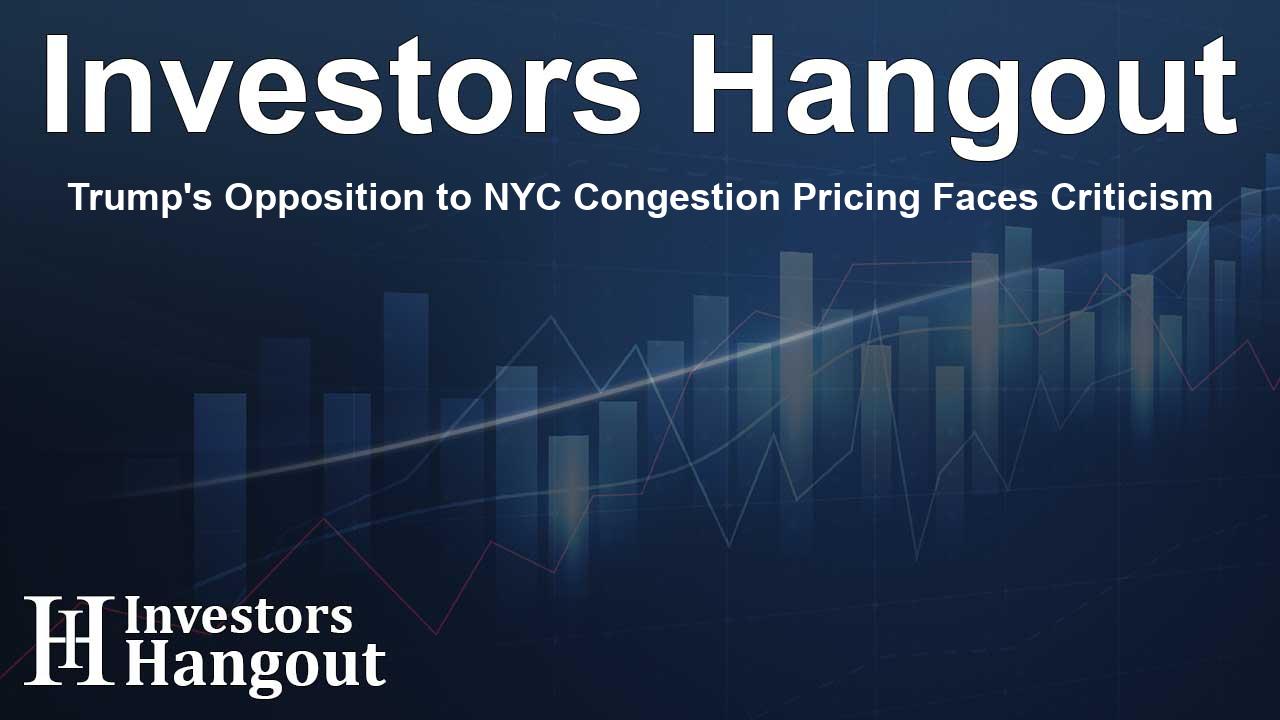Trump's Opposition to NYC Congestion Pricing Faces Criticism

Trump's Reversal on NYC's Traffic Management Plan
The recent decision by the Trump administration to halt New York City’s congestion pricing tolls has generated a significant response from various sectors of the city and beyond. This controversial move, which aims to alleviate congestion while funding essential public transit improvements, has been labeled by critics as a setback for urban management efforts.
Understanding the Decision
The White House's cancellation of federal approval for the congestion pricing initiative was delivered by U.S. Transportation Secretary Sean P. Duffy. This plan was originally set to charge vehicles an entry fee to the most heavily trafficked areas of Manhattan—specifically, $9 for most vehicles entering south of Central Park. The intention was not just to manage traffic flow but also to finance vital upgrades for the city's mass transit systems.
Initial Outcomes of the Tolls
Early observations indicated that the toll system had modestly improved traffic conditions, with reductions noted by transit officials. Despite this, Secretary Duffy criticized the tolls as an undue financial burden particularly affecting working-class families and small businesses. They argued that the economic implications could be debilitating for those who frequent Manhattan for work and leisure.
Trump's Response
Former President Donald Trump shared his jubilant reaction on social media, declaring, "CONGESTION PRICING IS DEAD. Manhattan, and all of New York, is SAVED." His message resonated with supporters who view the congestion pricing as an unwelcome expense imposed on residents and workers. Trump's comment drew attention, especially since his properties are positioned within the congestion pricing zone.
Governor Hochul's Retort
In contrast, New York Governor Kathy Hochul responded strongly to Trump's announcement, reinforcing that the state has not had to endure 'king-like' authority in over 250 years. Hochul reaffirmed the commitment to continue the tolling initiative, stating that legal proceedings will ensure the program's viability despite federal opposition. She underscored the importance of the tolls in addressing New York's chronic traffic challenges.
The Importance of Congestion Pricing
The congestion pricing initiative is not merely a revenue-generating mechanism; it is also part of a broader effort to reshape urban mobility and prioritize public transit improvements. It places New York City alongside other global cities, such as London and Stockholm, that have successfully implemented similar tolling strategies to mitigate congestion.
Financial Implications for Public Transit
The financial landscape in New York is precarious, as the Metropolitan Transportation Authority (MTA) faces a staggering $25 billion deficit. The funding generated from congestion pricing was expected to play a critical role in the MTA's capital budget, which supports much-needed renovations, signal upgrades, and sustainability initiatives aimed at enhancing the subway system.
Impacts on Ridesharing Services
Industries such as rideshare companies, notably Lyft Inc. and Uber Technologies, had shown support for the congestion pricing plan. They anticipated that the reduction in vehicles would streamline traffic, resulting in improved air quality and reduced travel times for ride-hailing services. The suspension of the toll initiative jeopardizes these prospective benefits and may introduce delays to essential transit funding.
Next Steps in the Saga
As the legal challenges surrounding this decision unfold, the future of congestion pricing in New York City remains uncertain. While the Trump administration has taken a stance against these tolls, local authorities and transportation advocates will continue their fight to ensure that these measures see the light of day. The discussions will likely center on balancing financial responsibilities, congestion management, and the overall sustainability of the city’s metropolitan infrastructure.
Frequently Asked Questions
What is congestion pricing?
Congestion pricing is a traffic management tool that charges vehicles entering high-traffic areas, designed to reduce congestion and fund public transit improvements.
Why was congestion pricing proposed in NYC?
The initiative aimed to decrease traffic congestion and provide critical funding for updating and maintaining the city's mass transit systems.
Who opposed the congestion pricing initiative?
The Trump administration opposed the proposal, citing concerns over financial impacts on the working class and small businesses.
What did Governor Hochul say about Trump's decision?
Governor Hochul criticized Trump's stance, emphasizing that New York hasn't been governed like a kingdom in over 250 years and vowed to continue with the congestion pricing initiative.
How will the suspension of congestion pricing affect rideshare companies?
The suspension may hinder improved service quality and air quality for rideshare companies like Uber and Lyft, as congestion levels could rise without the tolls.
About The Author
Contact Logan Wright privately here. Or send an email with ATTN: Logan Wright as the subject to contact@investorshangout.com.
About Investors Hangout
Investors Hangout is a leading online stock forum for financial discussion and learning, offering a wide range of free tools and resources. It draws in traders of all levels, who exchange market knowledge, investigate trading tactics, and keep an eye on industry developments in real time. Featuring financial articles, stock message boards, quotes, charts, company profiles, and live news updates. Through cooperative learning and a wealth of informational resources, it helps users from novices creating their first portfolios to experts honing their techniques. Join Investors Hangout today: https://investorshangout.com/
The content of this article is based on factual, publicly available information and does not represent legal, financial, or investment advice. Investors Hangout does not offer financial advice, and the author is not a licensed financial advisor. Consult a qualified advisor before making any financial or investment decisions based on this article. This article should not be considered advice to purchase, sell, or hold any securities or other investments. If any of the material provided here is inaccurate, please contact us for corrections.
